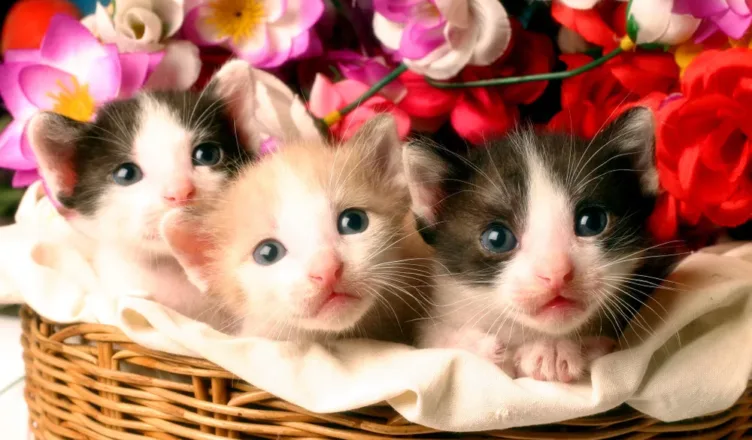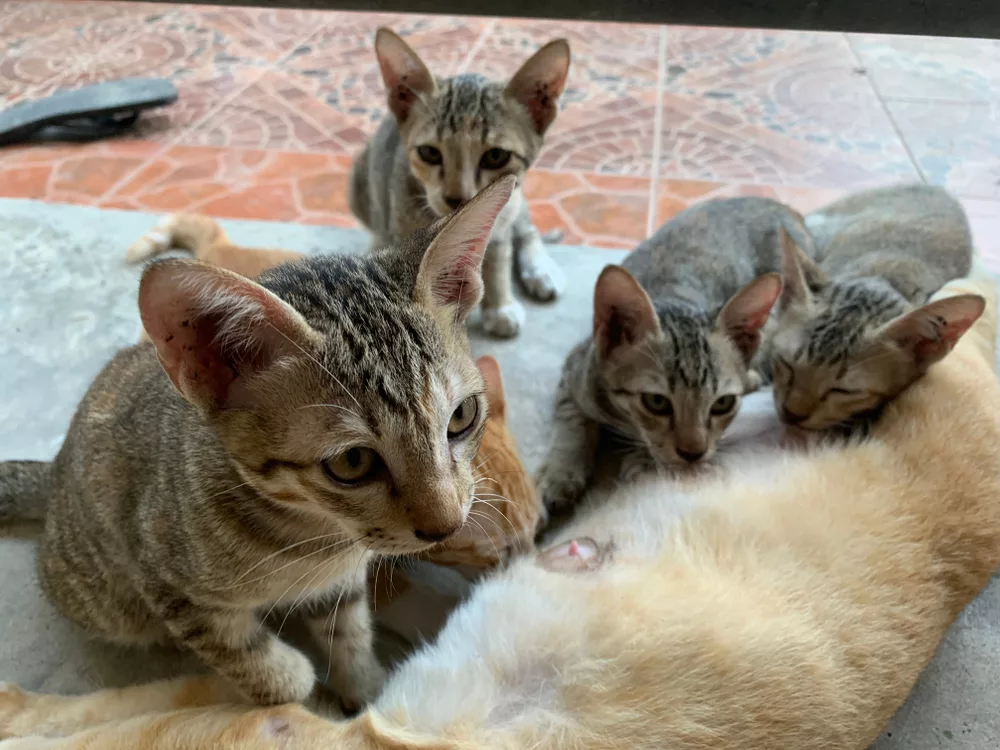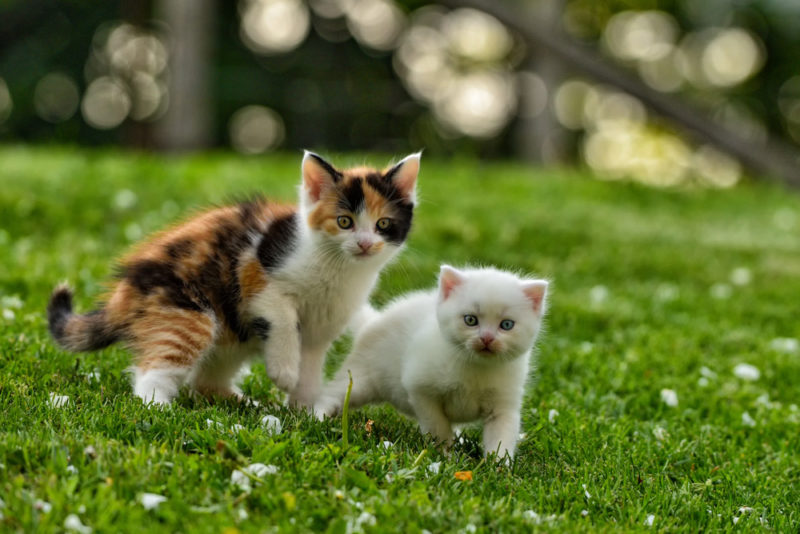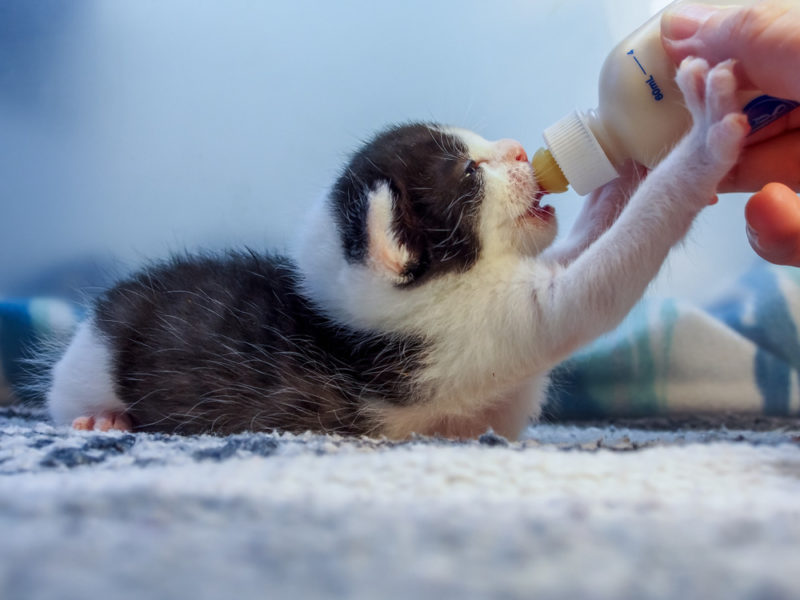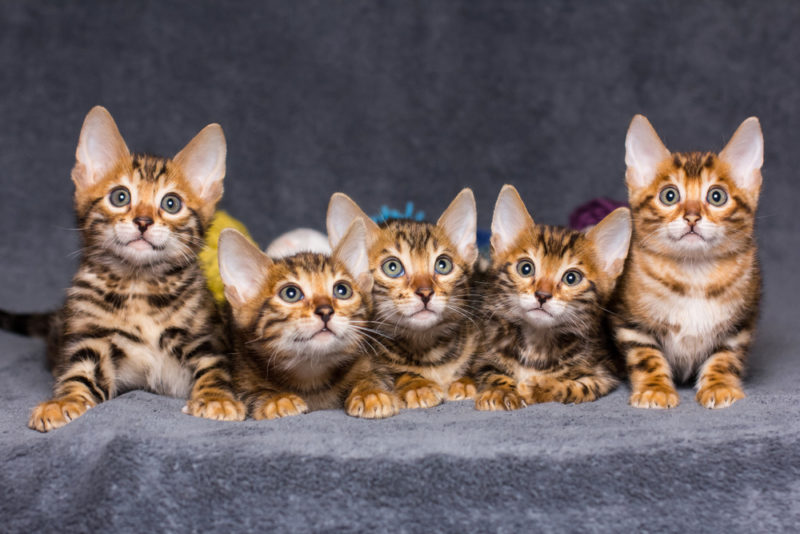The Maine Coon is a highly sought-after domesticated cat, being the second-most popular cat breed in the world, second only to the Persian. The enchanting world of newborn Maine Coon kittens is full of surprises and wonder.
These gentle giants, known for their luxurious fur and friendly personalities, begin their journey as tiny, vulnerable creatures. As they grow and learn during their first week of life, they experience a series of key milestones and physical changes.
Maine Coon Kittens come to our world with deaf-blindness. As soon as all the kittens are born, the cat will lie on its side, surrounding the kittens with its body, and will stay with them literally every minute of the first day after birth. Even after carefully rinsing them, she will continue to lick them and poke at them with a muzzle, encouraging them to suck.
The Exciting Arrival of Maine Coon Babies
The birth of a Maine Coon kitten is a miraculous event. After a gestation period of approximately 63 to 65 days, the mother gives birth to a litter of kittens. A typical litter size for Maine Coons ranges from 3 to 5 kittens, but it can be larger or smaller depending on the individual cat.
During the birthing process, the mother Maine Coon cat goes through several stages of labor. She will usually find a secluded, safe spot to deliver her kittens. Once the kittens are born, the mother will clean them by licking off the amniotic sac and umbilical cord, stimulating their first breaths.
Importance of Body Heat for Newborn Maine Coon Kittens
Heat and food for Maine Coon Kittens are the most important factors in the well-being of the first days of life. The kittens do almost nothing but feed and rest the first few days. That’s why keep them limited to one room or house. The only first thing you must do is show them their litter box.
Newborn kittens cannot maintain a constant body temperature on their own, which is one of the reasons why it is so important that they lie for the first few days, huddled against the warm belly of their mother. When a cat leaves the kittens for a very short time, they try to sleep in a heap. This helps them to store heat more efficiently.
If, for some reason, the kitten is supercooled, it should be warmed not with a hot water bottle but with your own body since too rapid a rise in temperature can only damage the baby.
You cannot feed a frozen baby because the stomach and intestines do not function, and the food will not be digested. In this case, the kitten can be given a 5-10% percentage solution of glucose (4 ml every hour), honey solution, or sent water (1 teaspoon per 3 ml). The solution should be slightly warm.
If the cat is nervous when you touch the kittens, then try to inspect the nest in its absence and do it in case of an emergency. Otherwise, the jealous mother can pull the kittens to find the most secluded corner inaccessible to the annoying hosts.
The Powerful Bonding Between Mother and Kittens
The bond between the mother cat and her kittens is crucial for their survival and development. In the initial days, kittens stay with the mother, and the mother cat’s instincts kick in as she nurtures, protects, and cares for her newborns. In turn, the kittens instinctively know to stay close to their mother for warmth, nourishment, and protection.
The Importance of Colostrum in Maine Coon Kittens’ First Week
Colostrum, often called the “first milk,” is a crucial component in the early development and survival of newborn Maine Coon kittens. The mother cat produces this nutrient-rich, antibody-packed milk shortly before and after giving birth. It plays a vital role in providing essential nourishment and protection for vulnerable kittens during their first week of life.
Providing Essential Nutrients
Colostrum is a concentrated source of essential nutrients, including proteins, fats, vitamins, and minerals. These nutrients are necessary for the kittens’ rapid growth and development during their initial days. The high protein content in colostrum provides the building blocks for the kittens’ developing muscles, tissues, and organs, while the fats supply energy to sustain their growth.
Building Immunity for Maine Coon Kittens 1 Week Old
During the first few hours after birth, the kittens’ digestive systems are uniquely designed to absorb the antibodies present in colostrum. These antibodies provide passive immunity, protecting the kittens from various pathogens and boosting their underdeveloped immune systems. This passive immunity is essential for the kittens’ survival until their immune systems are strong enough to effectively combat infections.
It is critical that newborn Maine Coon kittens receive colostrum within the first few hours of life. The kittens’ ability to absorb antibodies from colostrum decreases significantly after the first 24 hours. Therefore, timely consumption of colostrum is crucial for their overall health and immunity.
Supporting the Mother Cat’s Colostrum Production
During the first week of life, Maine Coon kittens rely solely on their mother’s milk for nourishment. To ensure that the mother cat produces enough colostrum for her kittens, it is essential to provide Maine Coon healthy Maine Coon food and care throughout her pregnancy and nursing.
A high-quality, nutrient-dense diet containing fatty acids and vitamins is vital for supporting her milk production and ensuring that the kittens receive the nourishment they need for healthy growth and development.
Tracking the Growth of Baby Maine Coon Cats
During their first week of life, Maine Coon kittens experience rapid growth. On average, kittens will double their birth weight by the end of the first week. Monitoring their weight gain daily is essential to ensure they are growing at a healthy rate. A digital kitchen scale is an excellent tool for tracking their progress.
Charting Growth Progress of Maine Coon Kitten Newborns
Maine Coon is the largest domesticated cat breed, and a Maine Coon is the longest cat in the world. So keeping a growth chart for your Maine Coon kittens can help you spot any potential health issues or growth abnormalities early on. A growth chart is a simple way to log each kitten’s weight daily, allowing you to monitor their progress and compare it to average growth rates for Maine Coon kittens.
Maine Coon growth chart
|
Age |
Average Weight Range |
|
Birth |
90-120 grams (3.2-4.2 ounces) |
|
1 week |
170-240 grams (6-8.5 ounces) |
| 2 weeks |
250-370 grams (8.8-13 ounces) |
| 3 weeks |
330-500 grams (11.6-17.6 ounces) |
|
1 month |
420-640 grams (14.8-22.6 ounces) |
| 2 months |
850-1,200 grams (1.9-2.6 pounds) |
|
3 months |
1.4-2.3 kg (3.1-5.1 pounds) |
| 4 months |
2.0-3.5 kg (4.4-7.7 pounds) |
| 5 months |
2.6-4.6 kg (5.7-10.1 pounds) |
| 6 months |
3.2-5.7 kg (7-12.6 pounds) |
| 9 months |
4.5-8.6 kg (9.9-19 pounds) |
|
1 year |
5.0-10.0 kg (11-22 pounds) |
Keep in mind that these are average weight ranges, and individual Maine Coon kittens may grow at different rates. Factors such as genetic makeup, diet, and overall health can influence your kitten’s growth and development. Gender is another factor for determining the weight, as Male Maine Coons can weigh higher than females.
To use the growth chart, weigh your Maine Coon kitten regularly (weekly during the first few months and then monthly as they approach adulthood) and record the weight. In the chart above, compare your kitten’s weight to the average weight range for their age.
If a kitten is not gaining or losing weight, it may indicate an underlying issue that requires veterinary attention. Also, monitor the overweighting as many Maine Coons were recorded as the biggest cat in the past till the Guinness Book of World Records withdrew the category.
The Evolution of the Maine Coon’s Distinctive Coat
Maine Coon kittens are born with a soft, downy coat that provides warmth and protection. Over the first week, their fur will start to grow and develop into the luxurious, long coat that Maine Coons are famous for.
Their fur’s true colors and patterns may not become fully apparent until several weeks or even months old. Gently start Maine Coon grooming and nail clipping at this early age to make it used to this. Give a balanced diet when it can chew to help fur develop, as this is one of the main factors determining the Maine Coon price.
The Emergence of Baby Teeth
Around the end of the first week, Maine Coon kittens will start to develop their baby teeth, also known as deciduous teeth. These teeth are essential for transitioning to solid foods in the coming weeks.
Although you may not see the teeth emerging just yet, they are beginning to form beneath the gums, preparing for their grand debut. A new Maine Coon kitten will have its teeth during the fourth week of life, and it’ll officially start biting things and food. At this stage, give them dry food along with wet food, not before this. It is necessary to know how to feed kittens. And this is the right time for starting Maine Coon cat training.
Development of Sensory and Motor Skills
The first week of a Maine Coon kitten’s life is marked by significant changes and rapid development of sensory and motor skills. As the kittens grow and mature, they gradually explore their surroundings and interact with their littermates, mother, and environment.
Understanding the developmental milestones of sensory and motor skills during this crucial period can help you better support and care for your Maine Coon kittens.
The Development of Hearing
Newborn Maine Coon kittens are born with closed ear canals, rendering them temporarily deaf. During the first week of life, their ear canals begin to open, allowing them to start experiencing the world of sound.
On the 5th day of life, the ears of the kittens begin to hear normally, and they have the first elementary reactions to loud enough sounds. It will continue to improve over the following weeks.
Witnessing the World for the First Time
At birth, Maine Coon kittens’ eyes are sealed shut. They will begin to open their eyes between 7 and 10 days of age, offering them their first glimpse of the world. Initially, their vision will be blurry, and they can only see objects at close range. However, their eyesight will gradually improve over the next few weeks as their visual system develops.
Despite their limited opportunities, Maine Coon Kittens start to accumulate information about the outside world starting from the second day. Sucking at first is purely instinctive, but now it is associated with the smell of a cat.
Maine Coon Kittens also recognize the smell of the nest, which they can begin to sniff out to find their way home if they are pushed out or drop out of the nest. If the kitten is left alone, frozen, or bruised, he calls for help, issuing a surprisingly loud alarm signal, causing an immediate reaction in the cat. Tiny kittens can recognize the touch of other people’s hands.
Rowing: The First Steps Towards Mobility
By the end of the first week, Maine Coon Kittens can move a little, “rowing” their forepaws (they develop faster than the rear ones). This mode of travel is enough to allow the kittens to reach the mother’s belly if they are accidentally pushed off, for example, during a particularly energetic cat’s attempt to lick their hair.
They use their sense of smell and touch to navigate, as their hearing and vision are still developing. This early exploration helps to strengthen their muscles and develop their coordination.
Discovering the Joys of Interaction and Playtime
Maine Coon is not a lap cat. It is a playful and outdoor cat. It enjoys playing games, family life and roam freely. Towards the end of the first week, Maine Coon kittens may start to engage in play with their littermates. Play is essential to their development, as it helps them learn social skills, practice hunting techniques, and develop their coordination and strength.
At this stage, play will be limited to gentle pawing, rolling, and mouthing as the kittens are still building their strength and motor skills. So, it is important to provide them with interactive Maine Coon toys like scratching post at this stage.
Supporting Sensory and Motor Skill Development
As a caregiver, there are several ways you can support the development of sensory and motor skills in Maine Coon kittens during their first week of life:
Providing a Stimulating Environment
Offer various textures, surfaces, and objects for the kittens to explore. This will help stimulate their senses and encourage the development of their motor skills.
Encouraging Play and Interaction
Gently engage with the kittens through play and interaction to help strengthen their muscles, develop their coordination, and build social skills.
Caring for 1 Week Old Maine Coon Kittens
As a pet owner, it’s important to know how to take care of a Maine Coon cat. Here are some important aspects of Maine Coon care at a young age you shouldn’t miss:
Maintaining a Clean and Comfortable Environment
Ensuring a clean and comfortable environment is crucial for the health and well-being of Maine Coon kittens 1 week old. The mother will typically care for her kittens’ hygiene by grooming them and stimulating them to eliminate waste.
However, cleaning the nesting area is important by regularly changing the bedding and removing soiled materials. A clean environment helps prevent infections and promotes overall health for both the mother and her kittens.
Potential Health Concerns in Maine Coon Kittens 1 Week Old
Although the Maine Coon breed is known as a healthy cat breed, the first week of life is a crucial period for growth and development. During this period, they are more prone to health issues than older cats.
So, it is essential to closely monitor their health to ensure they are thriving and identify any potential issues early on. By watching the kittens and taking appropriate action if needed, you can help ensure their well-being and set the foundation for a healthy, happy life. Following are the essential health checks to monitor:
Weight Monitoring
One of the easiest ways to monitor the health of Maine Coon kittens during their first week of life is by tracking their weight. Regular weight checks can help you spot any potential health issues or growth abnormalities early on. On average, newborn kittens weigh only 100 g. With normal nutrition, the kitten daily adds in weight from 10 to 20 g. It doubles its mass at birth in one week.
Checking for Signs of Health Concerns
In addition to monitoring weight, performing a gentle physical examination of the kittens can help identify potential health issues. Carefully examine each kitten’s body, looking for signs of dehydration, injuries, or abnormalities. Check for clear and bright eyes, clean ears, and a moist nose. Be aware of any signs of labored breathing, persistent crying, or lethargy, which may indicate underlying health concerns.
Common Health Concerns
During their first week of life, Maine Coon kittens may be susceptible to several health issues, including:
Fading Kitten Syndrome
A condition in which a kitten fails to thrive and loses weight and energy rapidly. This can be caused by various factors, including infections, parasites, or congenital issues.
Dehydration
Kittens can quickly become dehydrated if they are not nursing well or the mother is not producing enough milk.
Infections
Newborn kittens are susceptible to infections due to their underdeveloped immune system. Signs of infection may include lethargy, loss of appetite, and discharge from the eyes or nose.
When to Consult a Veterinarian?
It is essential to closely monitor the health of Maine Coon kittens during their first week of life and seek veterinary advice if you notice any concerning symptoms. Contact your veterinarian if you observe any of the following signs:
- A kitten is not gaining weight or is losing weight
- A kitten appears weak, lethargic, or unresponsive
- Difficulty breathing or persistent crying
- Signs of infection, such as discharge from the eyes or nose
Creating a Safe Space for Maine Coon Kitten Newborns
Before introducing your Maine Coon kittens to other cats in the household, it is essential to create a safe and secure space for the kittens and their mother. This will allow the mother to care for her kittens without feeling threatened by other cats and give the kittens a chance to grow and develop in a calm, protected environment.
Introducing the Scents and Sounds of the Household
Maine Coons are extremely intelligent as they are born with developed senses of smell and touch. So before direct introductions, start by allowing the other cats in the household to become familiar with the kittens’ scents and sounds.
You can do this by placing a blanket or towel from the kittens’ nesting area in a common area where the other cats can investigate it. This will help the other cats become more comfortable with the presence of the Maine Coon babies.
Supervised Introductions
When the time comes for the kittens to meet the other cats, ensure that the introduction is supervised and takes place in a neutral, stress-free environment. Allow the cats to sniff and investigate each other from a safe distance, and be prepared to intervene if any signs of aggression or fear arise.
Encouraging Interactions With Family and Other Pets
Introducing Maine Coon kittens to other pets, like dogs and cats of other breeds in the household, should be a gradual process, with multiple supervised interactions over several days or weeks.
Encourage positive interactions by providing treats, kitten proof toys, or other forms of positive reinforcement. It is essential to be patient and allow the cats to adjust to each other at their own pace.
Cherishing the First Week of Maine Coon babies
Dear Maine Coon owners and Maine Coon breeders, as you watch your baby Maine Coon cats grow and develop during their magical first week of life, remember to appreciate the unique moments and milestones they experience.
You set the stage for a lifetime of joy, companionship, and adventures by providing proper care, love, and attention. Treasure these precious moments, and look forward to the many delightful experiences that await you and your Maine Coon kittens as they continue to grow and flourish. Enjoy with the wonder of the cat world.
